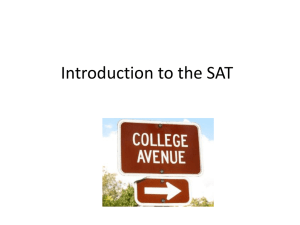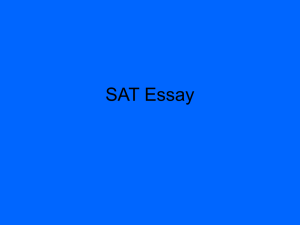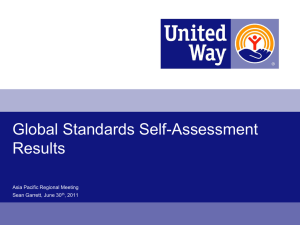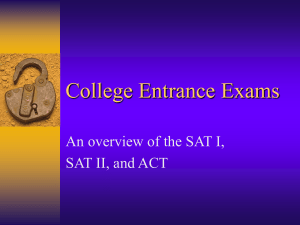ACT, SAT, Essay Writing
advertisement
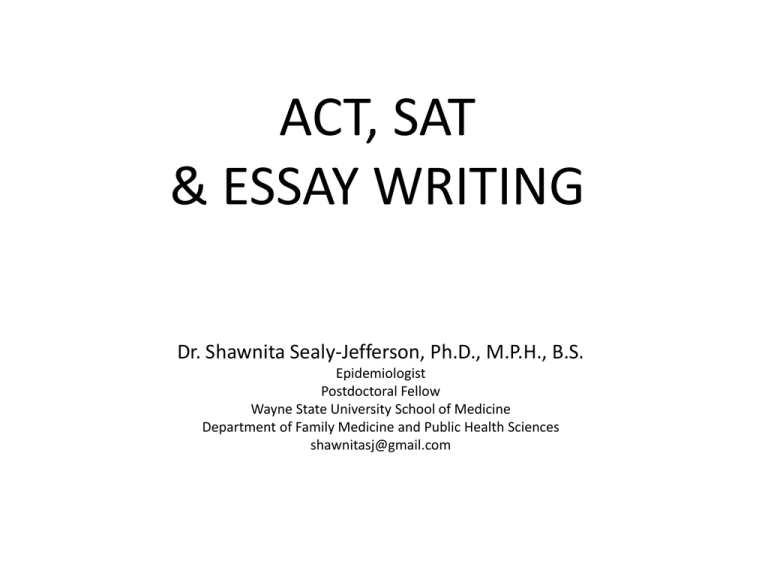
ACT, SAT & ESSAY WRITING Dr. Shawnita Sealy-Jefferson, Ph.D., M.P.H., B.S. Epidemiologist Postdoctoral Fellow Wayne State University School of Medicine Department of Family Medicine and Public Health Sciences shawnitasj@gmail.com Objectives 1) Discuss ACT and SAT What they are, test components, strategies for success 2) Compare and contrast ACT & SAT 3) Advantages/disadvantages of both 4) Discuss admission/scholarship essay writing Role of the essay Where to start when writing Mechanics Tips Should you have a reviewer? 5) Answer questions ACT American College Testing What is the ACT? Achievement test, measuring how much you learned in school Up to 5 components: English, Mathematics, Reading, Science, and an optional Writing Test Scale scores range from 1-36 Two scores for writing Test Combined english/writing score (1-36) Writing sub-score (2-12) Comments from one of the trained readers ACT national average score is 21 Typically taken first in junior year˚ Basics of preparation Become familiar with the content and format of ACT Learn appropriate test-taking strategies Use ACT Online Prep—ACT’s test preparation program Review “The Real ACT Prep Guide”—the official test prep book Take ACT’s free practice test See your counselor for other test preparation materials Visit the ACT website at www.actstudent.org˚ The Best Preparation Is A Solid High School Curriculum English Mathematics (Algebra 1 and above) Social Studies Science Foreign Language Arts 4 Years 4 Years 3 Years 3 Years 2 Years 1 Year˚ REMEMBER: Test scores are only ONE factor used for college admissions and scholarship decisions!!! What is the national average score for the ACT and what score do YOU want?!? ACT English Editing five short passages 75 questions - 45 minutes – 9 minutes Per passage Usage - Mechanics Skills 40Q 53% Punctuation 10Q 13% Comma Semicolon End-stop Dashes Hyphens quotes Grammar and Use Sentence Structure 12Q 16% 18Q 24% Tense Subject-verb agreement Pronoun use Adverb vs adjective Double negative Idioms Possessives comparisons Run-on Comma splice Fragment Coord conjunction Parallelism Misplaced modifiers Clauses Subordination Split construction Unintended meaning Rhetoric Skills 35Q 47% Strategy Organization Style 12Q 16% 11Q 15% 12Q 16% Appropriate support Main idea Audience Effective: Opening sentence Concluding sentence Paragraph development Sentence-level structure Paragraph-level structure Conciseness Ambiguity Low-level usage Shifting point of view ACT English Practice Question I grew up with buckets, shovels, and nets waiting by the back door; hip-waders hanging in the closet; tide table charts covering the refrigerator door; and a microscope was sitting on the kitchen table. A. B. C. D. No change Waiting, by the back door, Waiting by the back door, Waiting by the back door A. B. C. D. No change Would sit Sitting Sat ACT Math 60 questions - 60 minutes Direct use of math facts or formulas 32Q 53% Pre-Algebra 14Q 23% Word Problems 16Q 27% Elementary Algebra Intermediate Algebra 10Q 17% 9Q 15% Geometry 14Q 23% Inference/ decision making 12Q 20% Coordinate Geometry 9Q 15% Trigonometry 4Q 7% PRACTICE ACT MATH PROBLEM What is the value of x when 2x + 3 = 3x – 4 ? A) –7 B) -1/5 C) 1 D) 1/5 E) 7 ACT Reading 4 Passages – 40 Questions – 35 Minutes Read 750 words Prose/Fiction 10Q 25% Read 750 words Humanities 10Q 25% Explicit Questions 14Q 35% Specific Detail Sequence Cause/Effect Comparison Read 750 words Social Science 10Q 25% Read 750 words Natural Science 10Q 25% Implicit Questions 26Q 65% Author’s Voice Generalization Main Idea Conclusion Words in Context ACT Reading Practice Question (65) Existing that way all the time, on the edge of hunger, on the edge of kindness, gave Abshu an appreciation for a life fully lived. Do whatever job makes you happy, regardless of the cost; and fill your home with love. Well, his home became the community center right around the corner from Brewster place. • As it is used in line 65, the term the edge refers to a place where Abshu felt: A. most alive. B. unfulfilled. C. defeated. D. most competitive. ACT Science Reasoning 7 passages - 40 questions - 35minutes 3 passages Data Representation 15Q 37% Understand 7Q 17 5% Analyze 20Q 50% Generalize 13Q 32 5% 3 9 3 3 passages Research Summary 18Q 45% 3 6 9 1 Passage Conflicting Viewpoint 7Q 18% 1 Identify data points Identify units/labels Identify trends Identify variables Identify controls 5 Hypothesize Conclude Compare Evaluate 1 Extrapolate Interpolate Predict Generalize ACT Science Reasoning Practice Question • • Spent fuel (SF), a radioactive waste, is often buried underground in canisters for disposal. As it decays, SF generates high heat and raises the temperature of the surrounding rock, which may expand and crack, allowing radioactivity to escape into the environment. Scientists wanted to determine which of 4 rock types— rock salt, granite, basalt, or shale— would be least affected by the heat from SF. The thermal conductivity (how well heat is conducted through a material) and heating trends of the 4 rock types were studied. The scientists calculated the temperature increase that would be expected over a period of 100,000 yr in each rock type at a point within a site holding buried SF. • According this study, if another set of temperatures had been calculated for a time 1,000,000 years in the future, the calculated temperature increase in any of the 4 rock types would most likely be closest to: A. 0°C B. 10°C. C. 20°C. D. 30°C. 10 Strategies for ACT 1) Skip the directions 2) Skim the whole section 3) Pace yourself 4) Answer the easy questions first 5) When in doubt, guess 6) Don’t lose your confidence with tough questions 7) Frequently check your place on the answer sheet 8) Don’t get sidetracked by the unimportant 9) Understand what you’re being asked 10) Stop a minute or two before your time is up BONUS: Make a study plan and follow it ˚ SAT Scholastic Aptitude Test SAT: WHAT IS THE PURPOSE? Aptitude: predicts your potential for future success Assess your academic readiness for college Provides a path to opportunities, financial support and scholarships Measures the skills required for success in college and beyond! SAT Taken 1st time in spring of junior year Indicates how well you use skills and knowledge attained in and out of the classroom How you think, solve problems, and communicate 3 hr and 45 min exam 10 sections 3 critical reading sections 3 math sections 3 writing sections 1 experimental section Total score is between 600-2400 National average for the SAT is 1510˚ SAT Offered 7 times a year January, March, May, June, October, November, December Students can register at www.Collegeboard.com SAT Fee Waivers are available Cost is $45.00 and includes 4 score reports˚ SAT Critical Reading Time Total 70 minutes Two 25-minute sections One 20 minute section Content Reading Comprehension: Single paragraphs Longer passages Paired paragraphs Paired longer passages Sentence level reading Question Types Score Multiple-choice with 5 answer choices Critical Reading Sentence completions 200-800 SAT Writing Time Total: 60 minutes 25-minute essay One 25-minute multiple choice section One 10-minute multiple choice section Content Grammar and usage Word choice (diction) Question Types Multiple choice with 5 answer choices Identifying sentence errors Improving sentence errors Improving sentences Improving paragraphs Student-written essay Score 200-800; essay sub-score: 2-12 SAT PRACTICE WRITING PROBLEM Hoping to -------the dispute, negotiators proposed a compromise that they felt would be --------to both labor and management. A) enforce…useful B) end…divisive C) overcome…unattractive D) extend…satisfactory E) resolve…acceptable SAT Math Time Total: 70 minutes Two 25-minute sections One 20-minute section Content Algebra I Algebra II Geometry Data analysis, statistics, probability Question Types Multiple-choice with 5 answer choices Student-produced responses (grid-ins) Score 200-800 SAT SUBJECT AREA TESTS Measure your knowledge and skills in particular subject areas SAT Subject Tests fall into five general subject areas: English Languages Literature Chinese with Listening History French US History French with Listening World History German Mathematics German with Listening Mathematics Level 1 Spanish Mathematics Level 2 Spanish with Listening Science Modern Hebrew Biology E/M Italian Chemistry Latin Physics Japanese with Listening Korean with Listening 10 Strategies for SAT 1) 2) 3) 4) Create a study plan and follow it Don’t get stuck on any one question Learn the directions in advance For the essay, develop your ideas and express them clearly, using examples to back them up 5) For the writing multiple-choice questions, think about the simplest clearest way to express an idea 6) For sentence completions, as you read, try to predict what word should go in each blank 7) For reading comprehension questions, skim the passage to see what it’s about 8) For the math multiple choice, you’re allowed to use a calculator, but it won’t help you unless you know how to approach the problems 9) For the math grid-ins, you must come up with the answer and fill in the grid 10) Relax the night before the test OR BOTH???? What is the difference between an aptitude and an achievement test? ACT/SAT COMPARISON SAT Aptitude Test Given 7 times per year Reading, Math, and Writing ¼ of a point deduction for wrong answer on multiple choice 200-800 points per section, for a total score of 600-2400˚ ACT Achievement Test Given 6 times per year English, Math, Reading, Science Reasoning, and optional Writing No penalty for wrong answer 1-36 for each subject, averaged for a composite score, 2-12 for the Writing Test˚ ACT/SAT COMPARISON SAT Math section includes Algebra I, Geometry, and Algebra 2 Sends 4 free reports to colleges of your choice, each additional report is $10 Formulas given for math section˚ ACT Math section includes Algebra I, Geometry, Algebra 2, and Trigonometry Sends 4 free reports to colleges of your choice, each additional report is $10 No formulas given for math section˚ SAT Advantages SAT Disadvantages 10 short sections, the longest of which is 25minutes Tests 9th and 10th grade math, plus a few reasoning concepts About 1/4 of Critical Reading questions are vocabulary-based “Score choice”: choose to send best scores while suppressing lower scores˚ The SAT is about 4 hours long ¼ point penalty for wrong answers If you don’t like writing essays, the SAT begins with a timed essay that is graded and factored into your writing score˚ ACT Advantages Only 4 sections, the longest is 1 hour ~3 hours long “Score choice”: only send your highest score to colleges No penalty for incorrect answers˚ ACT Disadvantages Time demand can be profound Science section is challenging for those w/ difficulty reasoning with numbers and graphs Math concepts include trigonometry ACT English will certainly challenge knowledge of colons, hyphens, commas, etc˚ Additional Resources College Information – CSO College Center: www.CSOcollegecenter.org – The College Board: www.collegeboard.com – Peterson’s: www.petersons.com – The Common App: www.commonapp.org – Hobson’s Collegeview: www.collegeview.com – Colleges That Change Lives: www.ctcl.org Additional resources Testing – ACT: www.act.org – ACT Fee Waiver Instructions: www.actstudent. org/faq/answers/feewaiver.html – SAT: The College Board: www.collegeboard.com – SAT Fee Waiver Instructions: www.collegeboard com/student/testing/sat/calenfees/feewaivers.html – Preliminary SAT(PSAT): www.collegeboard com/student/testing/psat/about/html – Free Test Prep from Number2 com: www.number2.com – The Princeton Review: www.princetonreview.com – Kaplan’s Test Prep: www.kaptest.com ESSAY WRITING WHY DO I HAVE TO WRITE ESSAYS?!? Gives some context for your accomplishments Allows you to add your voice to the admission process Gives readers insight into you as a person Allows admission/scholarship committee to evaluate: Writing style Language usage Organization Persuasion skills Confidence˚ Role Of The Essay Allows you to add information that you couldn't share in other parts of the application Adds clarity, depth, and meaning to information collected in other parts of your application Enables you to make the best possible case for why you should be admitted/awarded a scholarship˚ ROLE OF THE ESSAY It's your only chance to explain to college admissions/scholarship committee why you are a good fit: become more than just another application become an individual share your personality your goals your experiences explain any opportunities or obstacles that have affected your academic record˚ TRUE OR FALSE (and why): If I write one good admission/scholarship essay, I can send the same essay to all of the schools/scholarship search committees? WHERE DO I START? Complete the application FIRST! Use the application to help you: Think about your life story and how you will convey it Think about your academic experiences as a whole Connect the issues raised by the application to your responses in your personal statement Find the questions that your readers might ask You as the writer have a responsibility anticipate & answer your readers' questions, even before they are asked˚ NOW WHAT?? 1) Investigate and explore your audience Info about the universities their admissions process What does the committee want to find out about applicants through the personal statement? This info can be found on the university or scholarship website 2) Explore Yourself! The more comfortable you are with writing about yourself and your story, the better your essay will be! Mechanics of Writing the Essay Be original - be yourself Tell a story - your story Remember to put things in the words and language with which you are comfortable Don’t use big, fancy words, especially if you are not sure of the meaning of the words A simple style is best Good writing sounds like speech rather than a vocabulary review lesson Use clear, vivid writing style˚ The body must relate to the first sentence of the paragraph Use transition words Your conclusion is crucial Revise, Revise, Revise! Read aloud what you have written to help you locate areas that don’t make sense Put your draft aside for one day, then read it again and revise˚ Tips for Writing : Get Personal A successful essay is the one where the reader learns about you and your life Details, Details, Details Use details to personalize your essay and to make it more interesting Be Honest Write about what really happened and who you really are Don’t just list the facts The why and how about the information is also important Use specific, concrete examples and language Avoid generalities like "being on the track team was fun” Make sure your response directly addresses the ? Expand on information contained elsewhere in your application ˚ Tips (cont) Get right to the point Adding unnecessary info is distracting and not helpful Adhere to word restrictions Better to be under the limit than over the limit Responses should complete the application The personal statement is an extension of your application It should provide new information Do not repeat things you've already said in other parts of your application A strong essay demonstrates self-awareness, a key indicator of intelligence˚ In your essay did you: 1) Assist the reader in learning about you? 2) Explain experiences, accomplishments, and point of view that you would contribute? 3) Explain your attributes and experiences that are not evident from your academic record? 4) Describe any unusual circumstances or challenges you have faced? 5) 6) 7) 8) 9) Discuss how you responded to these circumstances or challenges? Discuss your interest in your intended major? Discuss how your interest developed? Describe any relevant work or volunteer experience you’ve had? Discuss your long-term goals after the Bachelor’s degree? Should You Have Someone Review It? Having someone review the essay is a necessary step in the process Incorporate the suggestions for improvement Fine line between having your college essay edited and having it rewritten by the reviewer Ultimately, the essay you submit must be your work, not the reviewer’s Be careful about suggestions for major revisions like changing the basic thoughts and content of the essay or adding things that are NOT truly your story An essay that is written by someone else is not yours and should not submitted with your application FOR ADDITIONAL INFORMATION: General Websites http://www.collegeboard.com/apply/essay_skills/ http://www.carleton.edu/admissions/essay/ http://www.west.net/~stewart/beste.htm http://www.accepted.com/college/dosdonts.aspx http://www.accepted.com/college/tenwritingtips.aspx http://www.accepted.com/college/miningyouridentity.aspx



